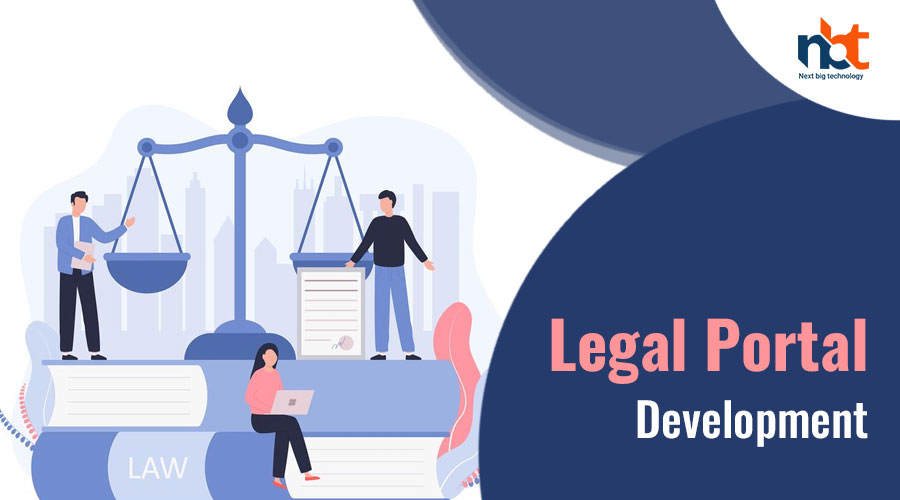Table of Contents
Legal Portal Development Services
In the digital age, where technology is constantly evolving, law firms are embracing innovative solutions to streamline their operations and enhance client satisfaction. One such solution that has gained prominence is legal portal development services. These services offer a comprehensive platform tailored to the unique needs of law firms, providing a centralized hub for managing cases, documents, communications, and more. In this article, we delve into the benefits and features of legal portal development services and explore how they can revolutionize the way law firms operate.
Understanding Legal Portal Development Services
Legal portal development services encompass a range of software solutions designed specifically for law firms. These platforms are highly customizable, allowing firms to tailor them to their specific practice areas, client base, and workflows. Whether it’s managing case files, tracking billable hours, or facilitating communication between attorneys and clients, legal portals offer a centralized solution that streamlines processes and improves efficiency.
Key Features and Functionality
- Case Management: Legal portals provide a centralized repository for managing case files, documents, and correspondence. Attorneys can easily access case information, track deadlines, and collaborate with colleagues, ensuring seamless workflow management.
- Document Management: With robust document management capabilities, legal portals enable firms to organize, store, and retrieve documents securely. Advanced search functionality and version control ensure that attorneys can quickly locate the information they need, reducing time spent on administrative tasks.
- Client Communication: Legal portals facilitate seamless communication between attorneys and clients, providing a secure platform for sharing confidential information, scheduling appointments, and providing updates on case progress. This enhances client satisfaction and fosters stronger client relationships.
- Billing and Invoicing: Integrated billing and invoicing features allow law firms to track billable hours, generate invoices, and manage payments efficiently. By automating the billing process, legal portals help firms streamline their financial operations and improve cash flow management.
- Collaboration Tools: Legal portals often include collaboration tools such as shared calendars, task lists, and messaging platforms, enabling attorneys to collaborate effectively and stay organized. Whether working on a complex litigation case or a transactional matter, these tools promote teamwork and productivity.
Benefits for Law Firms
- Increased Efficiency: By centralizing case management, document storage, and communication, legal portals eliminate the need for disparate systems and manual processes, saving time and reducing errors.
- Improved Client Service: Legal portals enhance client satisfaction by providing a user-friendly interface for accessing case information, communicating with attorneys, and tracking progress in real-time.
- Enhanced Security: With robust security features such as encryption, access controls, and audit trails, legal portals ensure the confidentiality and integrity of sensitive client data, mitigating the risk of data breaches.
- Scalability: Legal portals are scalable solutions that can grow with the needs of the firm. Whether adding new practice areas, expanding the client base, or onboarding additional staff, these platforms can accommodate growth and adapt to changing requirements.
- Competitive Advantage: By leveraging technology to streamline operations and deliver superior client service, law firms gain a competitive edge in a crowded marketplace. Legal portals differentiate firms as forward-thinking and tech-savvy, attracting clients and talent alike.
How to Create a Legal Portal Development
In today’s digital age, the legal industry is rapidly embracing technology to streamline processes, improve efficiency, and enhance client experiences. One significant advancement in this realm is the development of legal portals – online platforms that provide access to legal resources, documents, and services. Creating a legal portal development requires careful planning, strategic thinking, and attention to detail. In this guide, we’ll walk you through the essential steps to create a successful legal portal.
- Define Your Objectives: Before diving into the development process, it’s crucial to clearly define the objectives of your legal portal. Determine what specific services, resources, or functionalities you want to offer to your users. Whether it’s document management, case tracking, legal research, or client communication, understanding your goals will guide the development process.
- Conduct Market Research: Research existing legal portals to identify gaps in the market and opportunities for differentiation. Understand the needs and preferences of your target audience – whether they are individual clients, law firms, or corporate entities. Analyze competitor offerings to gather insights and inspiration for your own portal.
- Choose the Right Technology: Selecting the appropriate technology stack is critical for the success of your legal portal. Consider factors such as scalability, security, ease of integration, and customization capabilities. Depending on your requirements, you may opt for custom development using programming languages like Python or Ruby on Rails, or leverage existing platforms and frameworks such as WordPress or Drupal.
- Design User-Centric Interface: User experience (UX) design plays a pivotal role in the adoption and usability of your legal portal. Create intuitive navigation, clear information architecture, and visually appealing interface designs. Prioritize simplicity and ease of use to ensure that users can quickly find the information or services they need.
- Develop Functionalities and Features: Based on your defined objectives, begin developing the core functionalities and features of your legal portal. This may include user registration and authentication, document management, search functionality, secure communication tools, and integration with third-party services such as legal research databases or e-signature platforms.
- Implement Security Measures: Security is paramount when dealing with sensitive legal information and client data. Implement robust security measures to protect against unauthorized access, data breaches, and cyber threats. Utilize encryption, access controls, regular security audits, and compliance with relevant regulations such as GDPR or HIPAA.
- Test and Iterate: Thorough testing is essential to ensure the functionality, performance, and usability of your legal portal. Conduct comprehensive testing across different devices, browsers, and user scenarios. Solicit feedback from beta testers and iterate based on their suggestions and observations to refine the user experience and address any issues.
- Launch and Promote: Once your legal portal is thoroughly tested and refined, it’s time to launch it to the public. Develop a comprehensive marketing and promotion strategy to attract users and drive engagement. Utilize channels such as social media, email marketing, content marketing, and search engine optimization (SEO) to reach your target audience effectively.
- Monitor and Maintain: Post-launch, continue monitoring the performance and usage of your legal portal. Track key metrics such as user engagement, conversion rates, and system uptime. Regularly update and maintain the portal to address any bugs, add new features, and adapt to evolving user needs and technological advancements.
Why Should You Go for Legal Portal Development
In today’s fast-paced digital world, the legal industry is undergoing a significant transformation. With the increasing demand for online legal services, law firms and legal professionals are turning towards innovative solutions like legal portal development to streamline their operations and enhance client experiences. If you’re wondering whether investing in legal portal development is worth it, here are several compelling reasons why you should consider making the leap.
- Accessibility and Convenience: One of the primary benefits of legal portal development is the enhanced accessibility it offers. Clients can access legal services and information anytime, anywhere, with just a few clicks. This level of convenience not only improves client satisfaction but also increases the efficiency of legal professionals by reducing the need for face-to-face meetings and paperwork.
- Streamlined Communication: Legal portals provide a centralized platform for communication between clients, lawyers, and other stakeholders. Through secure messaging systems and document sharing features, all parties involved can communicate effectively, exchange information, and collaborate on cases in real-time. This streamlines the communication process, eliminates misunderstandings, and ensures that everyone stays informed and updated.
- Document Management and Organization: Managing and organizing legal documents can be a daunting task for law firms. Legal portal development simplifies this process by offering robust document management capabilities. Users can securely store, organize, and retrieve documents within the portal, saving time and reducing the risk of data loss or misplacement.
- Increased Efficiency and Productivity: By automating repetitive tasks and streamlining workflows, legal portals help improve the overall efficiency and productivity of legal professionals. Features such as online appointment scheduling, document templates, and case management tools enable lawyers to focus more on providing quality legal services and less on administrative tasks.
- Enhanced Client Experience: In today’s competitive legal landscape, providing exceptional client experiences is crucial for retaining clients and attracting new ones. Legal portals offer a user-friendly interface and personalized experiences tailored to each client’s needs. From accessing case updates to making payments online, clients appreciate the convenience and transparency that legal portals provide, leading to higher satisfaction rates and positive reviews.
- Compliance and Security: Security and compliance are paramount in the legal industry, where sensitive information is routinely exchanged. Legal portal development ensures compliance with industry regulations such as GDPR and HIPAA, protecting client data and maintaining confidentiality. Advanced encryption techniques and multi-factor authentication add layers of security, giving clients peace of mind knowing that their information is safe.
- Scalability and Customization: Whether you’re a solo practitioner or a large law firm, legal portal development offers scalability to accommodate your growing needs. You can customize the portal according to your firm’s branding, preferences, and specific requirements, ensuring that it aligns perfectly with your business objectives and enhances your professional image.
Market Prospects of Legal Portal Development and Platforms
In today’s fast-paced digital era, the legal industry is undergoing a significant transformation, with technology playing a pivotal role in reshaping how legal services are accessed and delivered. One such technological innovation that has gained traction in recent years is legal portal development and platforms. These platforms offer a wide range of services, from document management to case tracking, and they have the potential to revolutionize the way legal professionals work. In this article, we’ll delve into the market prospects of legal portal development and platforms, exploring the opportunities and challenges they present.
Understanding Legal Portals:
Legal portals are online platforms designed to streamline various aspects of the legal process, providing lawyers, law firms, and clients with convenient access to essential tools and resources. These portals typically offer features such as document management, case management, client communication tools, and legal research databases, among others. By centralizing these functions in a digital environment, legal portals aim to improve efficiency, collaboration, and transparency within the legal ecosystem.
Market Trends and Opportunities:
The market for legal portal development and platforms is witnessing steady growth, driven by several key trends and factors:
- Increasing Demand for Efficiency: In an increasingly competitive legal landscape, efficiency is paramount. Legal portals offer time-saving features such as automated document generation, electronic signatures, and secure client communication channels, enabling legal professionals to streamline their workflows and focus on delivering high-quality services.
- Rise of Remote Work: The global shift towards remote work, accelerated by the COVID-19 pandemic, has highlighted the importance of digital solutions in enabling remote collaboration and communication. Legal portals provide a centralized platform where lawyers and clients can interact, collaborate on documents, and track case progress from anywhere with an internet connection.
- Growing Embrace of Legal Tech: As technology continues to permeate every aspect of the legal industry, there is a growing acceptance of legal tech solutions among legal professionals. Law firms are increasingly investing in software and platforms that can enhance their productivity, reduce costs, and improve client satisfaction, driving the demand for legal portal development and platforms.
- Expanding Scope of Services: Legal portals are evolving beyond basic document management systems to offer a broader range of services. Some platforms incorporate artificial intelligence and machine learning capabilities for tasks such as contract analysis, legal research, and predictive analytics, further enhancing their value proposition for legal practitioners.
Challenges and Considerations:
Despite the promising prospects, legal portal development and platforms also face certain challenges and considerations:
- Security Concerns: Given the sensitive nature of legal information, security is a paramount concern for legal portals. Developers must implement robust security measures to protect data privacy, prevent unauthorized access, and ensure compliance with legal regulations such as GDPR and HIPAA.
- Integration Complexity: Integrating legal portals with existing software systems and workflows can be complex, especially for large law firms with legacy infrastructure. Developers need to ensure seamless integration with commonly used tools such as practice management software, document management systems, and billing platforms.
- User Adoption: The success of legal portals hinges on user adoption and engagement. Developers must design intuitive user interfaces, provide comprehensive training and support, and continuously solicit feedback from users to improve the platform’s usability and effectiveness.
- Regulatory Compliance: Legal portals must adhere to regulatory requirements specific to the legal industry, such as attorney-client privilege, confidentiality, and ethical rules governing lawyer conduct. Developers need to stay abreast of evolving regulatory frameworks and ensure that their platforms remain compliant at all times.
Essential Features of a Legal Portal Development
In the dynamic realm of law, where information is power, having a well-designed legal portal can be a game-changer. Whether you’re a law firm, legal department, or an individual practitioner, leveraging technology through a comprehensive legal portal can streamline operations, enhance collaboration, and improve client service. In this article, we delve into the essential features that make a legal portal development a success.
- User-Friendly Interface: The cornerstone of any successful legal portal is its ease of use. An intuitive interface ensures that users can navigate through the portal effortlessly, finding the information they need without hassle. Clear navigation, search functionalities, and categorization of content are crucial for enhancing user experience.
- Secure Access Control: Security is paramount in the legal industry, given the sensitive nature of legal information. Implementing robust access control mechanisms ensures that only authorized personnel can access confidential documents and data. Role-based access control (RBAC) allows administrators to define user permissions based on their roles within the organization.
- Document Management System: Efficient document management lies at the heart of a legal portal. Features such as version control, document indexing, and metadata tagging facilitate seamless organization and retrieval of legal documents. Integration with cloud storage solutions enhances accessibility and ensures data redundancy.
- Case Management Tools: For law firms and legal departments, managing cases is a fundamental aspect of operations. A legal portal should offer comprehensive case management tools, including case tracking, task assignment, deadlines management, and collaboration features. Integration with calendaring systems ensures timely reminders and alerts.
- Communication and Collaboration: Facilitating communication and collaboration among team members is essential for productivity and efficiency. Features like real-time messaging, discussion forums, and document sharing enable seamless collaboration, even in a remote work environment. Integration with email and messaging platforms enhances communication workflows.
- Client Portal: Providing clients with access to relevant case information and documents fosters transparency and strengthens client relationships. A client portal within the legal portal allows clients to securely access updates on their cases, review documents, and communicate with their legal representatives. Customizable branding adds a professional touch.
- Analytics and Reporting: Data-driven insights empower law firms and legal departments to make informed decisions and optimize their operations. Analytics dashboards provide visibility into key metrics such as case status, workload distribution, and resource utilization. Customizable reporting tools enable the generation of tailored reports for internal analysis and client reporting.
- Compliance and Regulatory Features: Compliance with legal regulations and industry standards is non-negotiable in the legal sector. A robust legal portal should incorporate features to ensure compliance with data protection regulations, confidentiality requirements, and ethical standards. Regular updates and audits help maintain compliance in a constantly evolving regulatory landscape.
- Integration Capabilities: Seamless integration with third-party applications and systems enhances the functionality and versatility of a legal portal. Integration with practice management software, billing systems, e-discovery tools, and legal research databases streamlines workflows and eliminates duplicate data entry.
- Scalability and Customization: As the needs of a law firm or legal department evolve, the legal portal should be able to scale and adapt accordingly. A flexible architecture allows for easy customization and extension of functionalities to accommodate changing requirements and business processes.
Advanced Features Legal Portal Development
In the ever-evolving landscape of legal services, the integration of advanced features in legal portal development stands out as a pivotal advancement. With the rapid digitization of legal processes, law firms and legal practitioners are leveraging technology to streamline operations, enhance client experiences, and stay competitive in the market. Advanced features in legal portals not only facilitate efficient management of cases and documents but also ensure compliance, security, and seamless communication. Let’s delve into the key advanced features transforming the realm of legal portal development.
- Document Management System (DMS): A robust DMS allows legal professionals to organize, store, and retrieve documents securely. Advanced DMS features include version control, document tagging, OCR (Optical Character Recognition) for text search within documents, and encryption for enhanced security. This ensures easy access to critical information while maintaining confidentiality and compliance standards.
- Case Management Tools: Advanced case management tools streamline the entire lifecycle of a case, from intake to resolution. These tools offer features such as task assignment, deadline tracking, court calendar integration, and customizable workflows. By centralizing case-related information and automating routine tasks, legal professionals can improve productivity and focus more on strategic decision-making.
- Client Portals: Client portals provide a secure platform for lawyers and clients to collaborate, share documents, and communicate effectively. Advanced client portals offer features like real-time case updates, secure messaging, document e-signature capabilities, and client intake forms. By fostering transparent communication and enabling self-service options, client portals enhance client satisfaction and loyalty.
- Legal Research Tools: Access to comprehensive legal research tools is essential for informed decision-making and case preparation. Advanced legal portals integrate AI-powered research tools that provide access to vast legal databases, case law analysis, and precedent search functionalities. These tools enable legal professionals to conduct thorough research efficiently, saving time and improving the quality of legal services.
- Compliance and Security Features: Compliance with data protection regulations and ensuring the security of sensitive information are paramount in legal portal development. Advanced portals incorporate features like role-based access control, audit trails, data encryption, and regular security audits to safeguard client data and maintain regulatory compliance. These features instill trust among clients and mitigate the risk of data breaches.
- Analytics and Reporting: Data-driven insights empower law firms to make informed decisions and optimize their operations. Advanced legal portals include analytics and reporting tools that offer insights into case metrics, resource utilization, client demographics, and financial performance. By tracking key performance indicators and identifying trends, legal professionals can drive efficiency, profitability, and strategic growth.
- Integration Capabilities: Seamless integration with third-party applications enhances the functionality and versatility of legal portals. Advanced portals support integration with billing software, document management systems, e-discovery tools, and CRM (Customer Relationship Management) platforms. This interoperability streamlines workflows, eliminates data silos, and enhances the overall efficiency of legal operations.
Legal Portal Development Timelines
In today’s digital age, the legal industry is experiencing a significant transformation with the advent of legal portals. These platforms offer lawyers, clients, and legal professionals a centralized hub for accessing legal resources, managing cases, and facilitating communication. However, the development of a legal portal is a complex process that requires careful planning, execution, and adherence to specific timelines. In this article, we will delve into the key aspects of legal portal development timelines, providing valuable insights for law firms and legal tech companies embarking on this journey.
- Initial Planning Phase (2-4 weeks): The development process begins with thorough planning and analysis. During this phase, stakeholders define the project scope, objectives, and requirements. Key considerations include identifying target users, determining essential features and functionalities, and outlining the technical architecture of the portal. Additionally, conducting market research and competitor analysis helps in understanding industry trends and identifying unique selling points.
- Design and Prototyping (4-6 weeks): Once the requirements are finalized, the focus shifts to designing the user interface (UI) and user experience (UX) of the portal. This phase involves creating wireframes, mockups, and prototypes to visualize the layout, navigation flow, and interaction elements. Designers work closely with stakeholders to ensure that the portal’s aesthetics align with branding guidelines and user preferences. Feedback from usability testing sessions helps in refining the design before moving to the development stage.
- Development and Implementation (12-16 weeks): The development phase involves coding the backend infrastructure, database architecture, and frontend components of the portal. Experienced developers use programming languages and frameworks suited to the project requirements, ensuring scalability, security, and performance optimization. Agile methodologies such as Scrum or Kanban are often employed to manage the development process efficiently, with regular sprints and milestone reviews. Continuous integration and testing practices help in identifying and addressing issues early in the development cycle.
- Quality Assurance and Testing (4-6 weeks): Quality assurance (QA) is a crucial aspect of legal portal development to ensure that the platform meets the highest standards of functionality, usability, and security. QA engineers conduct comprehensive testing, including functional testing, compatibility testing, performance testing, and security testing. Any bugs, errors, or inconsistencies identified during testing are documented, prioritized, and addressed by the development team. User acceptance testing (UAT) involving real-world users provides valuable feedback for further refinement.
- Deployment and Launch (2-4 weeks): With thorough testing completed and all issues resolved, the legal portal is ready for deployment. The deployment process involves configuring servers, setting up hosting environments, and deploying the application to production servers. Additionally, data migration from legacy systems and integration with third-party services may be carried out during this phase. A soft launch or beta testing phase allows for final adjustments and gathering user feedback before the official launch.
- Post-Launch Support and Maintenance: The launch of the legal portal marks the beginning of its lifecycle, requiring ongoing support, maintenance, and updates. A dedicated support team provides assistance to users, resolves technical issues, and addresses feedback and feature requests. Regular maintenance tasks such as software updates, security patches, and performance optimizations ensure the smooth functioning and longevity of the portal.
How Much Does It Cost to Build a Legal Portal Development?
In today’s digital age, the legal industry is increasingly embracing technology to streamline processes and improve accessibility for both legal professionals and clients. Legal portal development has emerged as a crucial aspect of this technological transformation, offering a centralized platform for managing legal information, documents, and services. However, one question that often arises is: How much does it cost to build a legal portal?
The cost of developing a legal portal can vary significantly depending on various factors, including the features and functionality required, the complexity of the project, and the choice of development approach (custom development vs. using pre-built solutions). Let’s delve deeper into these factors to get a better understanding of the costs involved:
- Features and Functionality: The cost of building a legal portal largely depends on the features and functionality you wish to incorporate. Basic features may include user authentication, document management, search functionality, and secure communication channels. However, if you require advanced features such as e-signature integration, case management tools, client portals, or AI-powered legal research capabilities, the development costs will naturally be higher.
- Complexity of the Project: The complexity of the legal portal project also plays a significant role in determining its cost. A simple portal with standard features and a straightforward user interface will be less expensive to develop compared to a complex portal with intricate workflows, integrations with third-party systems, and extensive customization options.
- Development Approach: When it comes to legal portal development, businesses have two primary options: custom development or using pre-built solutions. Custom development offers greater flexibility and customization but tends to be more expensive and time-consuming. On the other hand, pre-built solutions or legal portal development platforms can provide a faster time-to-market and lower initial costs, although they may come with limitations in terms of customization and scalability.
- Design and User Experience: A well-designed user interface (UI) and a seamless user experience (UX) are essential for the success of any legal portal. Investing in professional UI/UX design services can enhance usability, drive user engagement, and ultimately contribute to the overall success of the portal. However, these services come at an additional cost.
- Maintenance and Support: Building a legal portal is not a one-time investment. Ongoing maintenance, updates, and technical support are essential to ensure the portal remains secure, functional, and up-to-date with changing legal requirements and technological advancements. Budgeting for long-term maintenance and support is crucial to the sustainability of the portal.
How to Create a Legal Portal Development – Team and Tech Stack
In today’s digital age, legal portals have become essential tools for law firms, corporate legal departments, and individuals seeking legal assistance. These platforms provide a centralized hub for accessing legal resources, managing cases, and facilitating communication between clients and legal professionals. Developing a successful legal portal requires careful planning, a skilled team, and the right technological foundation. Let’s explore the key steps to create a legal portal, including assembling your team and selecting the appropriate tech stack.
Understanding the Project Scope
Before diving into development, it’s crucial to define the scope of your legal portal project. Consider the specific needs of your target users, the features and functionalities required, and any regulatory compliance standards that must be met. Collaborate with legal experts and stakeholders to gather requirements and prioritize features based on their importance and feasibility.
Building Your Team
Creating a legal portal is a multidisciplinary endeavor that requires expertise in various domains. Here are the key roles you’ll need to fill:
- Project Manager: Responsible for overseeing the entire development process, managing timelines, budgets, and resources.
- Legal Experts: Provide domain knowledge and insights into legal processes, ensuring that the portal meets industry standards and compliance requirements.
- UI/UX Designer: Designs the user interface and experience, focusing on ease of navigation, accessibility, and visual appeal.
- Developers: Frontend and backend developers proficient in web development languages and frameworks such as HTML, CSS, JavaScript, and Python or Ruby on Rails.
- Database Administrator: Manages the database infrastructure, ensuring data integrity, security, and scalability.
- Quality Assurance (QA) Engineer: Conducts thorough testing to identify and resolve bugs, usability issues, and performance bottlenecks.
- Legal Content Writers: Create and curate legal content, including articles, documents, and FAQs, to populate the portal and provide valuable resources to users.
- Security Expert: Implements robust security measures to safeguard sensitive data and protect against cyber threats.
Selecting the Tech Stack
Choosing the right technology stack is critical for building a scalable, secure, and efficient legal portal. Consider the following components:
- Backend Framework: Select a robust backend framework such as Django or Flask for Python, or Ruby on Rails for Ruby, to handle server-side logic and database interactions.
- Frontend Framework: Utilize modern frontend frameworks like React.js or Angular.js to create dynamic and responsive user interfaces.
- Database: Choose a reliable database management system (DBMS) such as PostgreSQL or MySQL to store and retrieve data securely.
- Cloud Hosting: Consider hosting your legal portal on cloud platforms like Amazon Web Services (AWS) or Microsoft Azure for scalability, reliability, and flexibility.
- Security Measures: Implement industry-standard security protocols such as HTTPS, encryption, access controls, and regular security audits to protect sensitive information.
- API Integration: Integrate with third-party APIs for features such as payment processing, document management, or legal research tools to enhance the functionality of your portal.
- Mobile Compatibility: Ensure that your legal portal is optimized for mobile devices to reach a broader audience and provide convenient access on-the-go.
Legal Portal Development Process
In today’s digital age, the legal industry is rapidly embracing technology to streamline processes, improve efficiency, and enhance client experiences. One such technological advancement that has gained significant traction is the development of legal portals. These platforms serve as centralized hubs for legal professionals to manage cases, collaborate with clients, access resources, and much more. However, navigating the legal portal development process requires careful planning, collaboration, and adherence to regulatory requirements. In this guide, we’ll explore the essential steps involved in developing a legal portal.
- Define Objectives and Requirements: Before embarking on the development journey, it’s crucial to clearly define the objectives of the legal portal. Identify the specific needs it should address, such as case management, document storage, client communication, or billing. Additionally, outline the essential features and functionalities required to meet these objectives. Consult with stakeholders, including lawyers, paralegals, and IT professionals, to gather comprehensive requirements.
- Compliance and Security Considerations: Compliance with legal regulations and data security standards is paramount in the development of legal portals. Ensure that the portal complies with industry-specific regulations such as GDPR, HIPAA, or any other regional data protection laws. Implement robust security measures to safeguard sensitive client information against unauthorized access or breaches. Engage legal experts and cybersecurity professionals to assess and address compliance and security requirements effectively.
- User Experience (UX) Design: A user-friendly interface is essential for ensuring widespread adoption and usability of the legal portal. Collaborate with UX/UI designers to create intuitive layouts, navigation structures, and interactive elements. Prioritize simplicity and ease of use, keeping in mind the diverse technical proficiency of users. Conduct usability testing to gather feedback and refine the design iteratively.
- Development and Integration: Engage experienced developers proficient in web development frameworks and technologies relevant to legal portals. Adopt an agile development approach to facilitate continuous feedback and iteration. Integrate the portal with existing legal software systems, such as case management tools, document management systems, and billing platforms, to ensure seamless workflow integration.
- Testing and Quality Assurance: Thorough testing is essential to identify and rectify any bugs, glitches, or performance issues before deploying the legal portal. Conduct functional testing to validate the core features and functionalities. Perform compatibility testing across various devices, browsers, and operating systems. Implement automated testing frameworks to streamline the testing process and ensure consistent quality.
- Training and Adoption: Provide comprehensive training and onboarding support to users to facilitate smooth adoption of the legal portal. Develop training materials, tutorials, and user guides to familiarize users with the portal’s features and functionalities. Offer ongoing support and assistance to address any questions or challenges encountered during the transition period.
- Continuous Improvement: The development of a legal portal is an ongoing process that requires continuous improvement and refinement. Gather feedback from users regularly to identify areas for enhancement and optimization. Monitor usage patterns and analytics data to gain insights into user behavior and preferences. Iterate on the portal’s features and functionalities based on feedback and data-driven insights.
Next Big Technology – Your Trusted Legal Portal Development Partner
In today’s fast-paced digital era, the legal industry is undergoing a significant transformation. As law firms and legal professionals strive to adapt to the changing landscape, having a robust online presence has become imperative. This is where Next Big Technology emerges as your trusted legal portal development partner, offering tailored solutions to meet your unique needs.
With a deep understanding of both the legal and technological landscapes, Next Big Technology brings a wealth of expertise to the table. Whether you’re a small law firm looking to establish an online presence or a large corporation seeking to streamline your legal processes, we have the tools and experience to deliver results.
Our team of skilled developers and designers works closely with you to understand your specific requirements and objectives. We recognize that every legal entity is different, and therefore, we approach each project with a personalized touch. From custom website design to advanced functionality integration, we ensure that your legal portal not only meets but exceeds your expectations.
One of the key benefits of partnering with Next Big Technology is our commitment to staying ahead of the curve. We understand that technology is constantly evolving, and we make it our mission to keep abreast of the latest trends and developments in the field. This allows us to offer cutting-edge solutions that give you a competitive edge in the market.
Security is paramount when it comes to legal portals, and we take this aspect very seriously. Our development process adheres to the highest security standards, ensuring that your sensitive data remains safe and protected at all times. From robust encryption protocols to regular security audits, we leave no stone unturned in safeguarding your information.
Moreover, we understand the importance of search engine optimization (SEO) in driving traffic to your legal portal. Our team employs advanced SEO techniques to optimize your website for maximum visibility and reach. By leveraging targeted keywords, optimizing meta tags, and implementing other SEO best practices, we help you rank higher in search engine results and attract more potential clients.
At Next Big Technology, we believe in building long-term partnerships based on trust, transparency, and mutual success. Our dedicated support team is always on hand to address any questions or concerns you may have, ensuring a seamless experience from start to finish.
Enterprise Legal Portal Development
In today’s fast-paced business environment, legal compliance and efficient management of legal processes are paramount for any enterprise striving for success. With the increasing complexities of legal frameworks and regulations, organizations are turning towards innovative solutions to streamline their legal operations. One such solution gaining traction is Enterprise Legal Portal Development.
What exactly is an Enterprise Legal Portal? It’s a comprehensive online platform designed to centralize and optimize all legal activities within an organization. From contract management to compliance tracking, document storage to case management, these portals offer a one-stop solution for all legal needs.
Here are some key benefits of investing in Enterprise Legal Portal Development:
- Centralized Information Access: One of the primary advantages of an Enterprise Legal Portal is the ability to consolidate all legal information in one easily accessible location. This ensures that all stakeholders, whether they’re legal professionals or other department heads, have access to the same up-to-date information, reducing the risk of miscommunication or missed deadlines.
- Improved Collaboration: Collaboration between different departments and legal teams is essential for ensuring compliance and mitigating legal risks. Enterprise Legal Portals often include features such as real-time document sharing, task assignment, and communication tools, fostering seamless collaboration across the organization.
- Enhanced Compliance Management: Staying compliant with ever-changing regulations can be challenging, especially for large enterprises operating in multiple jurisdictions. Enterprise Legal Portals typically offer compliance tracking functionalities, including automated alerts for upcoming deadlines or regulatory changes, helping organizations stay on top of their compliance obligations.
- Efficient Contract Management: Contracts are the backbone of any business, and managing them effectively is crucial for minimizing risks and maximizing opportunities. Enterprise Legal Portals streamline the entire contract lifecycle, from creation and negotiation to approval and renewal, reducing the time and resources spent on manual contract management processes.
- Data Security and Confidentiality: Legal documents often contain sensitive information that requires robust security measures. Enterprise Legal Portals provide advanced security features such as role-based access control, encryption, and audit trails, ensuring that confidential data remains protected from unauthorized access or breaches.
- Scalability and Customization: Every organization has unique legal requirements and workflows. Enterprise Legal Portals offer scalability and customization options, allowing businesses to tailor the platform to their specific needs and scale as their operations grow.
Top Legal Portal Development Companies
In the digital age, legal portal development has become an essential aspect of the legal industry. Legal portals provide a centralized platform for law firms, attorneys, and clients to streamline communication, manage cases efficiently, and access legal resources. As the demand for robust legal portals grows, it’s crucial to identify the top legal portal development companies that excel in delivering innovative and tailored solutions. In this article, we will explore the leading companies in the legal portal development domain.
-
-
Next Big Technology:
Next Big Technology is one of the top development companies for the high-quality development of mobile apps and web development services. They have having experienced in-house team of developers who provide top-notch development services according to the business requirements. NBT provides highly business-oriented services and implements all the latest and trending tools and technologies. They always work hard to deliver a top-notch solution at an affordable cost. They are having experience of more than 13 years and delivered lots of projects around the globe to businesses and clients.
NBT is highly focused on providing top-notch development solutions at a very affordable cost. By using their market experience and development experience, they are delivering proper solutions to clients and various industries for their custom requirements.
Location: India, USA, UK, Australia
Hourly Rate :< $25 per Hour
Employees: 50 – 249
Focus Area
- Mobile App Development
- App Designing (UI/UX)
- Software Development
- Web Development
- AR & VR Development
- Big Data & BI
- Cloud Computing Services
- DevOps
- E-commerce Development
Industries Focus
- Art, Entertainment & Music
- Business Services
- Consumer Products
- Designing
- Education
- Financial & Payments
- Gaming
- Government
- Healthcare & Medical
- Hospitality
- Information Technology
- Legal & Compliance
- Manufacturing
- Media
-
- Thomson Reuters: A Global Legal Technology PowerhouseThomson Reuters, a giant in the legal information and technology space, has a strong foothold in legal portal development. The company provides comprehensive solutions catering to the diverse needs of legal professionals. With a global presence and a reputation for delivering high-quality products, Thomson Reuters is a go-to choice for law firms seeking top-notch legal portal development services.
- MyCase: Tailored Solutions for Law Firms of All SizesMyCase specializes in offering cloud-based legal practice management solutions, including legal portal development. Recognized for its flexibility and scalability, MyCase caters to law firms of all sizes. The company’s commitment to staying ahead of technological advancements ensures that its legal portal solutions are both innovative and reliable.
- Zola Suite: Elevating Legal Practice ManagementZola Suite is renowned for its holistic approach to legal practice management, and its legal portal development services are no exception. With a focus on providing integrated solutions, Zola Suite enables law firms to enhance collaboration, communication, and efficiency. The company’s dedication to delivering customized portal solutions makes it a top contender in the legal tech landscape.
- LEAP: Streamlining Legal OperationsLEAP is a legal practice management and accounting software provider that includes robust legal portal development in its suite of services. The company’s emphasis on simplifying legal operations and enhancing client engagement positions it as a reliable choice for law firms looking to invest in efficient legal portal solutions.
FAQs on Legal Portal Development
In today’s digital age, the legal industry is swiftly embracing technological advancements to streamline processes and enhance accessibility. Legal portal development has emerged as a game-changer, offering law firms, legal professionals, and clients a centralized platform for managing cases, accessing legal resources, and facilitating communication. If you’re curious about legal portal development, you’ve come to the right place. Let’s delve into some frequently asked questions to provide you with a comprehensive understanding of this innovative solution.
1. What is a legal portal? A legal portal is a secure online platform designed specifically for the legal industry. It serves as a centralized hub where law firms, legal professionals, and clients can collaborate, share information, manage cases, and access legal resources such as documents, templates, and databases. Essentially, it streamlines various legal processes and facilitates communication among stakeholders.
2. How does a legal portal benefit law firms? Legal portals offer numerous benefits to law firms, including enhanced efficiency, improved client communication, streamlined case management, and increased accessibility to legal resources. By centralizing data and communication channels, legal portals enable law firms to optimize workflows, reduce administrative burdens, and deliver better service to clients. Additionally, they enhance collaboration among team members and provide a platform for securely storing and sharing confidential information.
3. What features should a legal portal include? A comprehensive legal portal should encompass a range of features to meet the diverse needs of its users. Some essential features include case management tools, document management capabilities, secure messaging systems, calendaring and scheduling functionalities, task management tools, client portals for communication and file sharing, user permissions and access controls, integration with other legal software, and robust security measures to protect sensitive information.
4. Is a legal portal suitable for solo practitioners or small law firms? Absolutely! Legal portals are scalable solutions that can be tailored to suit the needs of solo practitioners, small law firms, mid-sized firms, and large corporate legal departments alike. Even solo practitioners can benefit from the efficiency and organization offered by a legal portal, enabling them to manage cases more effectively, communicate with clients seamlessly, and access necessary legal resources with ease.
5. How can clients benefit from using a legal portal? Clients stand to gain significantly from using a legal portal. These platforms provide clients with convenient access to case-related information, documents, and communication channels, empowering them to stay informed and engaged throughout the legal process. Additionally, client portals within legal portals enable clients to securely upload documents, communicate with their legal representatives, track case progress, and access important updates, fostering transparency and trust between clients and their legal advisors.
6. Is data security a concern with legal portals? Data security is a top priority in the development of legal portals. These platforms are built with robust security measures, including encryption protocols, access controls, authentication mechanisms, and regular security audits, to safeguard sensitive information from unauthorized access, breaches, or cyber threats. Legal portals adhere to industry best practices and compliance standards to ensure the highest level of data protection and confidentiality for users.
7. Can a legal portal be customized to suit specific requirements? Yes, one of the key advantages of legal portals is their flexibility and customization capabilities. Legal portal developers work closely with clients to understand their unique needs and tailor the platform accordingly. Whether it’s customizing workflows, integrating third-party applications, designing personalized dashboards, or incorporating specific features, legal portals can be adapted to align with the preferences and requirements of individual users or organizations.
Thanks for reading our post “Legal Portal Development”. Please connect with us to learn more about the Legal Portal.
























